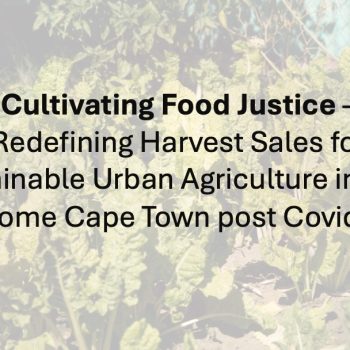About
To facilitate the creation of new knowledge and tools, the ACC has partnered with the City of Cape Town, together aiming to make a powerful contribution to sustainable urban development, both in practice and in theory.
Researcher-official collaboration
Two mechanisms for knowledge transfer between academic researchers and City officials are being utilised for the purposes of the project:
Firstly, four academic researchers working on policy areas that relate to the M-UF focus areas of green, fair and dense cities, are embedded in the City of Cape Town in relevant departments, working towards shared urban sustainability objectives. The policy areas that the researchers are engaging were jointly selected by the City and the ACC, and are seen as being both important for urban sustainability and dependent on new knowledge for their success. These areas are:
1) climate adaptation planning, coordinated by Anna Taylor
2) green economy, coordinated by Anton Cartwright
3) space economy, coordinated by Rob McGaffin
4) energy governance, coordinated by Saul Roux
The researchers have simultaneously supported policy development by contributing content-relevant knowledge, developing strategic partnerships with stakeholders both within and outside local government, and documenting the process of policy development so as to make urban policy and decision making processes more transparent and legible. The work being conducted at the City is central to doctoral research being conducted by each of the researchers.
Secondly, City officials involved in urban sustainability policy development and/or implementation in the City have, in turn, been selected to spend a two-month practitioner fellowship at the University of Cape Town, hosted by the ACC, where they are supported in writing-up their account of policy development and/or implementation within their respective fields. In this way, they are able to reflect on their practice in light of academic debates, as well as contribute towards the goal of making policy more legible, and disseminating practical experiences and lessons. Knowledge is thus shared and co-produced, creating a new platform for meaningful interaction between academics and practitioners.
The third round of this City officials exchange is currently underway. This round differs slightly from the previous two in that, instead of producing articles that are each submitted to a relevant journal, the selected officials and their academic writing partners are each co-producing a book chapter that together will form the basis of an edited volume dealing with the challenges of and opportunities for addressing climate change at the city scale through the pursuit of sustainable and resilient urban development. The book follows on from, and adds to, the knowledge base established in the first phase of the Cape Town Climate Change Think Tank, a knowledge partnership that culminated in the publication of Climate Change at the City Scale: Impacts, mitigation and adaptation in Cape Town (2012).
Furthermore, the M-UF Governance and Policy for Sustainability (GAPS) programme that ended in 2014, aimed to understand how sustainable urban development has been conceptualised and understood in different contexts in relation to the pressures of globalisation, inequalities, resource constraints and climate change. It also aimed to illustrate the role of knowledges in shaping different responses to the challenges of sustainable urban development. As part of a process of identifying potential points of leverage for achieving policy outcomes that support sustainable development, this project sought to examine the factors within local government that enable and constrain decision-making for sustainable urban development.
image credit: Bruce Sutherland

